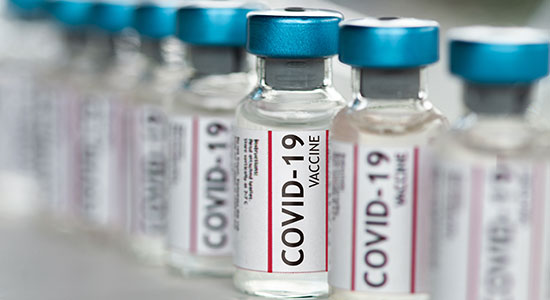
Dec. 16, 2020 – As each day of COVID-19 passes, anticipation grows for a vaccine to remove social barriers and get back to some level of normalcy. For employers, that may mean transitioning remote employees back to office or other work locations. But can employers mandate vaccines?
COVID-19 vaccines are now approved but they won’t be available to large segments of the world population until spring or summer 20211 because of challenges with production capacity, vaccination supplies, staffing to reach everyone, and efficacy.2
But according to a recent poll, only 50 percent of Americans are willing to get the vaccine. That means about 25 percent of Americans would need to be “mandated” to get the vaccine if the goal was to eliminate all of the other restrictions that have been implemented, such as face coverings and social distancing.
State and local governments could constitutionally mandate the vaccine.3 But employers might also want to take action and protect their workforce by mandating their employees to get the vaccine.
Exceptions May Apply
The Equal Employment Opportunity Commission (EEOC) has said in its latest guidancethat employers should “encourage” employees to get the flu vaccine (see Question #13.) That will likely be its stance once a COVID-19 vaccine becomes available.
Religious belief as well as disability are two exceptions to a potential vaccine mandate by employers. These exceptions are protected by the Americans with Disabilities Act (ADA) (protects individuals with disabilities) and Title VII of the Civil Rights Act (protects individuals’ religious beliefs).
Thus, if an employer decides to mandate all of its employees to get the flu or COVID-19 vaccine, when available, under the ADA and Title VII, as well as any state laws, the employer must make exceptions for employees who claim that a disability or sincerely held religious belief prevents them from taking the vaccine.
Of course, if reasonably accommodating employees who ask for an exception to a vaccine mandate would cause the employer undue hardship, the employer may deny the request for exemption.
More Insight into the Religious Exemption
Because of the anti-vaccine movement – which some reputable sources say is growingand exceedingly effective at using social media – it is important to consider the likelihood of successful legal challenges to employer vaccination mandates.
Luckily, there are court cases that shed some light on how a legal challenge may play out. In one case, Fallon v. Mercy Catholic Medical Center of Southeastern Pennsylvania,4 the Third Circuit Court of Appeals decided in favor of the employer’s flu vaccine mandate.
The employee challenged the employer for terminating his employment after he refused to take the vaccine. Mr. Fallon refused the vaccine because he believed the vaccine would do more harm than good, and invoked the religious exemption to be excused from getting the vaccine. The Third Circuit ruled that Mr. Fallon’s belief that the vaccine was harmful did not qualify as a sincerely held religious belief.
To qualify as a religious belief, the court described religion this way: “First, a religion addresses fundamental and ultimate questions having to do with deep and imponderable matters. Second, a religion is comprehensive in nature; it consists of a belief system as opposed to an isolated teaching. Third, a religion often can be recognized by the presence of certain formal and external signs.”5
The court noted that anti-vaccination beliefs could be part of a broader religious faith and therefore protected under Title VII. But that wasn’t the case for Mr. Fallon.
However, in another case, Chenzira v. Cincinnati Children’s Hospital Medical Center,6 an Ohio federal court found that veganism could qualify as a belief equal to that of traditional religious views. In that case, the employee who was fired for refusing the hospital employer’s flu vaccine mandate stated that her vegan lifestyle prohibits the ingestion of any animal or animal by-products, which can exist in vaccines.7
The court found it plausible that an employee could subscribe to veganism “with a sincerity equating that of traditional religious views.” As a result, the court did not dismiss the case, but the parties later settled.
The Lesson for Employers
As the COVID-19 vaccine rolls out, employers will be faced with a decision as to whether they should mandate their employees to receive it to ensure that sufficient numbers of individuals are immune and life can return to “normal.”
Employers who choose to mandate vaccines must be ready for potential challenges, particularly relating to disability or religious concerns. In the religious context, there are legal cases that support both sides of the debate.
However, it is important to note that unlike previous legal cases addressing mandatory vaccines, the COVID-19 vaccine does not benefit from years of experience and use.
Thus, it is plausible that employees may feel even more apprehensive than normal about injecting a substance that has not been tested for a very long period of time.
Indeed, some employers may have internal policies that prohibit mandating anything deemed “experimental,” which may apply to the COVID-19 vaccine as it rolls out. Employers must also weigh those concerns when deciding whether to mandate the vaccine.
Endnotes
1 Anna Edney, et al., Experts share a clearer timeline of when most Americans will get COVID-19 vaccine, Fortune (Aug. 11, 2020).
2 Sarah Bartsch, et al., Vaccine Efficacy Needed for a COVID-19 Coronavirus Vaccine to Prevent or Stop an Epidemic as the Sole Intervention, Am. J. of Preventive Medicine (Oct. 2020).
3 See Jacobson v. Massachusetts, 197 U.S. 11 (1905).
4 Fallon v. Mercy Catholic Med. Ctr. of Se. Pennsylvania, 877 F.3d 487 (3d Cir. 2017).
5 Id.
6 Chenzira v. Cincinnati Children's Hosp. Med. Ctr., No. 1:11-CV-00917, 2012 WL 6721098, at *1 (S.D. Ohio Dec. 27, 2012).
7 Id.
